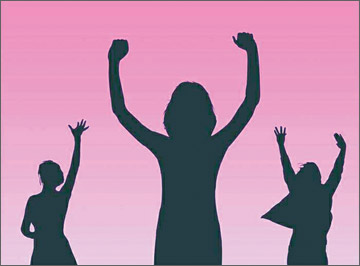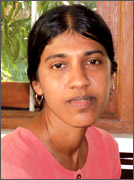Women power and Politics
Ishara Jayawardane
The topic of women’s representation in politics has long been a bone
of contention. The question as to why there is no sufficient
representation of women in politics is an issue that must be addressed.
On this subject, the Daily News Gender Forum spoke to Chulani Kodikara,
Research Associate for the International Centre for Ethnic Studies.
*Why isn’t there sufficient representation of women in politics in
Sri Lanka?

 |
|
Chulani
Kodikara |
Politics is all over the world. Not only in Sri Lanka, whether women
are educated or not, whether countries are rich or not. Politics is an
extremely difficult field for women to enter anywhere in the world. The
only exception has been the Nordic countries: Sweden, Denmark, Norway
and Finland, where from the 60s onwards for various reasons they have
very progressive social democratic parties. These Nordic countries have
a very strong welfare state, but elsewhere in the world it has been
extremely difficult for women to enter politics.
Often people talk about this paradox in Sri Lanka as we have high
human development indicators. Women are educated, women are in the
labour market in Sri Lanka, why are women not in politics? Politics is
very much a male domain and it is very difficult for women to enter that
domain for various different reasons.
One is the way political parties are structured. Women tend to get
marginalized. Also if women are still cooking, cleaning, looking after
children, plus doing a job, there is only a very little time for women
to do politics. We call it “Gender Division of Labour in Society”.
In Sri Lanka women are doing many things - they are educated, they
are going to university, but over the years the Gender Division Of
Labour within the home has really changed very little. Looking after
elderly people, disabled people all fall on women. We call it the double
or triple burden of work. They are cooking, cleaning, looking after
children, taking care of elders and doing a job. Where is the time to do
politics?
*What are the other constraints of doing politics?
If you talk about the constraints of trying to do politics, you can
actually think of it in terms of three levels.
Firstly in terms of the numbers of men and women who self select.
There are far fewer women who self select themselves to do politics .
This is for various reasons.
1. The Division of Labour and the Burden of Work
2. Culturally in Sri Lanka Politics is seen as a ‘men’s domain’ by
women themselves and by political parties. Only a very few women get
interested in politics naturally.
Secondly there are women who are members of political parties who go
campaigning for male politicians but even they don’t see themselves as
professional politicians.
Because within the parties themselves, women are not nurtured to
become political leaders.
Thirdly, at the level of the electorate, even when women come
forward, not enough people will vote for them regardless of the fact
that 52 percent of the population in this country are women.
Local Government is the lowest level of government and it is the
easiest to do politics in . Local Government meets once a month, so you
can do your job and still do politics. However the number of women in
local government is 1.8 percent. It is probably one of the lowest in the
world.
*What can women do to effect a change?
We are living in a very patriarchal society and there are still
certain boundaries women cannot cross. Politics is about power. It is
more about attitudes. To increase the number of women in politics, women
have to come forward as political candidates. And they need to be given
nominations by political parties.
There are less women who come forward asking for nominations, but
still there are enough. Giving all the constraints I am talking about,
there are still enough women who are interested in politics. But they
don’t get nominations. They are not seen as suitable candidates by
political parties.
Young men are nurtured and mentored by older party people. They put
their weight behind young candidates who have done service to the party.
But politicians don’t reward women who have done things for the party by
nurturing them as political leaders.
*What are the reasons that the situation is better in other
countries?
This is because of special government measures or affirmative actions
or quotas or reservation of women. Quotas are either through law or
voluntarily. Parties say; “We are going to give so many places of our
nomination lists to women”.
It is not only in the West but even in South Asia there are more than
30 percent women in local government and in some local councils up to 50
percent.
India has reserved seats for women. 1/3 of all local councils in
India are reserved for women. In South Africa after Apartheid ended,
there was a voluntary quota for women in their parties.
*What caused this global change?
The Global Women’s movement. It is an issue which has been so common
across the borders in most countries. The UN has an international
regulation where they say all elected political bodies around the world
should aim to have 30 percent of women. They call this a critical mass.
This is the percentage necessary for women to have an impact at some
level.
*So is it merely a case of attitude and perception?
It plays some part, but also it is a question of resources. To do
politics in this country you need lots of money. Women don’t have that
kind of money to do politics. Women also don’t have the skill and the
necessary network to mobilize resources. Men have more connections and
because their chances of winning are better, more people are willing to
fund them.
*How are countries like Afghanistan, Bangladesh, India, Pakistan and
Nepal fairing?
Funnily enough, India, Pakistan, Bangladesh and Nepal have a 30
percent quota for women in local government. Afghanistan also has a
reservation for women. With its new constitution a 10 percent quota was
introduced for women.
|



